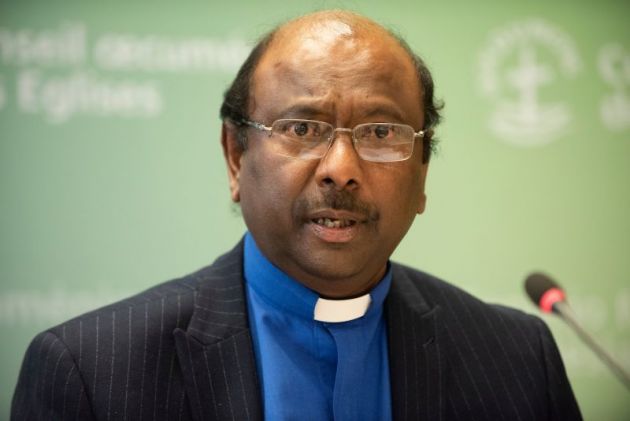Climate, protection of creation, at forefront for faith thinkers, but not always for the faithful

Faith these days plays a big part in people's interaction with climate with Christian leadership across the board pinning their beliefs to creation.
Pope Francis on Nov. 1 said he would attend the crucial COP28 climate talks starting in Dubai on November 30, weeks after warning that time is running out to act on global warming, AFP reported.
It will be the first time a pope has attended a COP meeting in person since the process began in 1995.
"I will go to Dubai. I think that I will leave on December 1 through the 3rd. I'll spend three days there," the 86-year-old head of the Roman Catholic Church told Italy's Rai 1 television.
Another of pointer came when World Council of Churches general secretary Rev. Jerry Pillay met with Right Livelihood executive director Ole von Uexkuell and Right Livelihood board chair Rev. Gunilla Hallonsten in Geneva, Switzerland on Oct. 30.
Right Livelihood describes itself as a courage-powered community for social change, and it annually bestows awards to individuals or organizations, to recognize "the actions of brave visionaries and building impactful connections around the world."
RIGHT LIVELIHOOD
The WCC and Right Livelihood discussed mutual support and synergies, particularly involvement in the global network of laureates, as well as initiatives related to climate justice and peacebuilding.
The WCC and the Right Livelihood had organized a day-long seminar on May 12, offered in a hybrid format, to support and empower churches and faith-based communities to respond more effectively to the challenges of environmental degradation and climate change.
WCC general secretary Rev. Prof. Dr Jerry Pillay said after the meeting "Right Livelihood has many areas that mutually overlap with the council's priority of addressing climate-related issues for positive social change and the inclusion of local actors like religious leaders and communities.
"We are extremely keen about working together in areas of peace and caring for the earth and creation. Most commendable is Right Livelihood's focus on practical information and involvement when it comes to climate justice."
Pillay underlined the need for "forming collaborative partnerships has the potential to create a high impact in making a sustainable difference and solving global problems."
He noted, "We look forward to working with Right Livelihood on issues of common interests to make a difference in the world."
Right Livelihood executive director Ole von Uexkull and its board chair Rev. Gunilla Hallonsten stressed the importance of faith-based approaches in working for sustainability.
Hallonsten said she was "impressed with the work that churches around the world do to for climate justice. And I see much more potential."
Uexkull said he looksc forward to "linking faith-based actors with Right Livelihood Laureates to mutually strengthen their work on the ground."
Pillay was accompanied by WCC communication director Marianne Ejdersten and Rev. Nathan Day Wilson, WCC manager, of Income Monitoring & Development.
CARING FOR THE EARTH
Von Uexkull had said spoken at the April 15 April meeting held at the WCc titled "Caring for the Earth, Transforming Lives: Linking Faith & Natural Regeneration."
He said his organization wants to work with change-makers like the WCC.
"What will it take to create a global movement to re-green the earth?" said von Uexkull, addressing the participants towards the end of the meeting.
The 2023 United Nations Climate Change Conference or Conference of the Parties of the UNFCCC, more commonly referred to as COP28, will be the 28th UN Climate Change conference, held from Nov. 30 until Dec, 12, at the Expo City, Dubai.
The UN says that taith-based organizations, or FBOs as they are called, and religious leaders are an important presence at the UN Framework Convention on Climate Change Conference of Parties.
They demonstrate "that religious and spiritual communities are essential to the fight against climate change and to achieving the Sustainable Development Goals (SDGs) and the goals of the Paris Agreement."
UNEP, through the Faith for Earth Coalition, launched a robust COP28 preparation process in January 2023 under the mechanism of the Interfaith Coordination Group on Climate Change.
But getting the faithful to support the views of religious leaders is not always easy.
MULTIFAITH EFFORT
A group of mostly mainline Protestant and Jewish leaders launched a seven-year campaign to advocate for meaningful climate solutions, "One Home One Future" the latest multifaith effort intended to engage congregations in caring for the Earth.
But a new survey released by the Public Religion Research Institute suggests that work won't be easy.
Beliefs on the severity of climate change have not shifted much among religious traditions over the past decade and few religious Americans view climate change as a crisis, according to the PRRI study published Oct. 4.
"While the scientific consensus is clear that human activities, particularly through carbon emissions, are the main culprit of climate change, political views differ with respect to the causes of climate change, its political importance, and how to address it," said PRRI.
"Moreover, religious views on climate change are far from monolithic."
